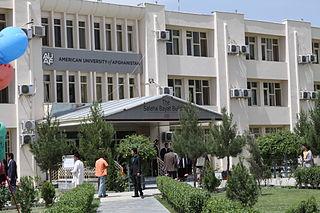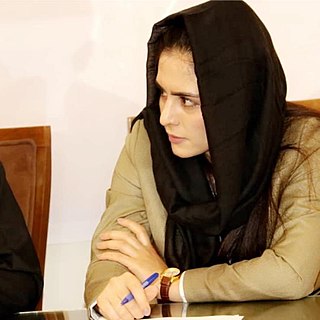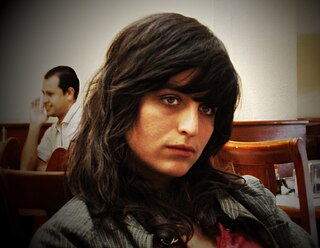Related Research Articles

The economy of Afghanistan is listed as the 124th largest in the world in terms of nominal gross domestic product (GDP), and 102nd largest in the world in terms of purchasing power parity (PPP). With a population of around 41 million people, Afghanistan's GDP (nominal) stands at $14.58 billion as of 2021, amounting to a GDP per capita of $363.7. Its annual exports exceed $2 billion, with agricultural, mineral and textile products accounting for 94% of total exports. The nation's total external debt is $1.4 billion as of 2022.

The treatment of women by the Taliban refers to actions and policies by various Taliban regimes which are either specific or highly commented upon, mostly due to discrimination, since they first took control in 1996. During their first rule of Afghanistan (1996–2001), the Taliban were notorious internationally for their misogyny and violence against women. In 1996, women were mandated to wear the burqa at all times in public. In a systematic segregation sometimes referred to as gender apartheid, women were not allowed to work, nor were they allowed to be educated after the age of eight. Women seeking an education were forced to attend underground schools, where they and their teachers risked execution if caught. They were not allowed to be treated by male doctors unless accompanied by a male chaperone, which led to illnesses remaining untreated. They faced public flogging and execution for violations of the Taliban's laws.
Kabul University is one of the major and oldest institutions of higher education in Afghanistan. It is in the 3rd District of the capital Kabul, near the Ministry of Higher Education. It was founded in 1931 by King Mohammed Nadir Shah, whose prime minister at the time was his younger brother, Sardar Mohammad Hashim Khan.

Quran desecration is the treatment of the Quran in a way that might be considered insulting.

Education in Afghanistan includes K–12 and higher education, which is under the Ministry of Education and Ministry of Higher Education. In 2021, there were nearly 10 million students and 220,000 teachers in Afghanistan. The nation still requires more schools and teachers. Soon after the Taliban takeover of the country in August 2021, they banned girls from secondary education. Some provinces still allow secondary education for girls despite the ban. In December 2022, the Taliban government also prohibited university education for females in Afghanistan, sparking protests and international condemnation.

Mohammad Haneef Atmar is a Afghan politician and former KhAD agent. He served as the Minister of interior until he was removed from the Ministry by Hamid Karzai in the wake of attacks on the June 2010 Afghan Peace Jirga. Before that he worked with several international humanitarian organisations and served as Minister of Rural Rehabilitation and Development and Minister of Education. In 2011, he was part of the Right and Justice party. During his time in office, he has visited several countries to get funding to stabilise Afghanistan.

Mary Akrami is the director of the Afghan Women Skills Development Center. She represented Afghan civil society at the 2001 Bonn Conference. In 2003 the Afghan Women Skills Development Center opened the first women’s shelter in Kabul, Afghanistan. The shelter provides legal advice, literacy classes, psychological counseling, and basic skills training to women who need them. Akrami is on call 24 hours a day at the shelter, and under her leadership some of the women there have denounced their abusers publicly and filed court cases against them, something almost unheard of before. She has faced threats for her work.

Shamsia Hassani is an Afghani street artist, a fine arts lecturer, and the associate professor of Drawing and Anatomy Drawing at the Kabul University. She has popularized "street art" in the streets of Kabul and has exhibited her art in several countries including India, Iran, Germany, United States of America, Switzerland, Vietnam, Norway, Denmark, Turkey, Italy, Canada, and in diplomatic missions in Kabul. Hassani paints graffiti in Kabul to bring awareness to the war years. In 2014, Hassani was named one of FP's top 100 global thinkers. She was recognized as one of the BBC's 100 women of 2021.

Zarifa Ghafari is a former female mayor of Maidan Shahr, capital city of the Wardak Province, Afghanistan. Ghafari was one of the few Afghan female mayors, next to the first Afghanistan's mayor, Azra Jafari and Khadija Zahra Ahmadi, and was also the youngest to be appointed, at the age of 24. She is known for her efforts to advance women's rights in Afghanistan. Ghafari was chosen as an International Woman of Courage in 2020 by the US Secretary of State. She has survived three assassination attempts.
Laila Haidari is an Afghan activist and restaurateur. She runs Mother Camp, a drug rehabilitation centre she founded in Kabul, Afghanistan, in 2010. She also owns Taj Begum, a Kabul cafe that funds Mother Camp. Taj Begum is frequently raided because it breaks taboos; the cafe is run by a woman and allows unmarried men and women to eat together. Haidari is the subject of the 2018 documentary film Laila at the Bridge. She was recognized as one of the BBC's 100 women of 2021.

Hasina Jalal is an advocate for women's rights and democracy in Afghanistan. In 2014, Jalal was elected by public vote to receive the "N-Peace Award" from the UNDP Asia Pacific Regional Office and the UN Secretary General's Special Advisor on the University for Peace. In 2012, she co-founded the National Association of Afghanistan Civil Society with the membership of more than 50 non-profit and non-governmental organizations in Afghanistan. She has strived to raise the voices of Afghan women and girls in various regional and international platforms and has co-founded the first alliance of South Asian women on women's economic, social, and culture rights in Sri Lanka. In her last position at the government of Afghanistan, she was heading the international donors' funded programs and initiatives to the mines, oil, and gas sectors of Afghanistan.
Protests in Afghanistan against the Taliban started on 17 August 2021 following the Fall of Kabul to the Taliban. These protests are held by Islamic democrats and feminists. Both groups are against the treatment of women by the Taliban government, considering it as discriminatory and misogynistic. Supported by the National Resistance Front of Afghanistan, the protesters also demand decentralization, multiculturalism, social justice, work, education, and food. There have been pro-Taliban counterprotests.
MahboubaSeraj is an Afghan journalist and women's right activist.

Crystal Bayat is an Afghan social activist and human rights advocate known for her protests against the Taliban takeover, advocacy for women rights and political activism inside and outside Afghanistan. A native of the Ghazni province, Shia (coming from the Bayat family, a Turkic ethnicity minority. Bayat was born in 1997 in Kabul. She grew up most of her life with democracy and positive societal changes. She is currently continuing the fight to preserve Afghan human right's achievements as an agent of change.

Paola Villarreal is a Mexican computer programmer who developed the Data for Justice app equipped with an interactive map that compares police operations in white dominated areas and minority neighborhoods in Mexico. Data from the app helped reversed 20,000 racially unbalanced drugs convictions.
Zahra Joya is an Afghan journalist. She is the founder of Rukhshana Media, an outlet in Persian and English which she runs from exile.
Faiza Darkhani is an Afghan environmentalist, women's rights activist, and educator. In 2021, she was part of the 100 Women BBC list, which includes the most inspiring and influential women in the world. Darkhani is one of the few scholars of climate change within Afghanistan. She formally was the director of the National Environmental Protection Agency in Badakhshan province.
Nasrin Husseini is an Afghan-born Canadian advocate of refugees, veterinary researcher, and a food activist, working to remake the food system. Her research focuses on advancing animal health through breeding and improving the productivity of the food derived from farm animals. In 2021, she was part of the 100 Women BBC list, which includes the most inspiring and influential women in the world.
Hoda Khamosh, born in 1996, is an Afghan journalist, poet, and a women's rights activist.
Rada Akbar, is an Afghan-born conceptual artist, and photographer. The focus of her artwork has been to denounce the oppression of women, and ask the world to see the strength of Afghan women through her artwork and photographic portraits. She was chosen as one of the BBC's 100 most influential women of 2021.
References
- ↑ "Displaying items by tag: Afghanistan". www.silkroadstudies.org. Retrieved 2022-02-23.
- ↑ NIMA ROOZ: Survey Says Afghans Hopeless About Future | TOLOnews , retrieved 2022-02-24
- 1 2 "CELA 4 Biography Book" (PDF). CELA Network. July 2005. Retrieved February 25, 2022.
- 1 2 3 4 5 Glinki, Stefanie (November 25, 2019). "Afghanistan woman breaks ground with Kabul recycling plant". Los Angeles Times. Retrieved February 23, 2022.
- ↑ "Afghan Women's History". Afghanistan Online. 2018-03-24. Retrieved 2022-02-24.
- 1 2 "Virus wipes away Afghan toilet-paper maker's plans". www.thenews.com.pk. Retrieved 2022-02-24.
- ↑ "BBC 100 Women 2021: Who is on the list this year?". BBC News. 2021-12-07. Retrieved 2022-02-28.